Hospitals warn of disruption as doctors strike
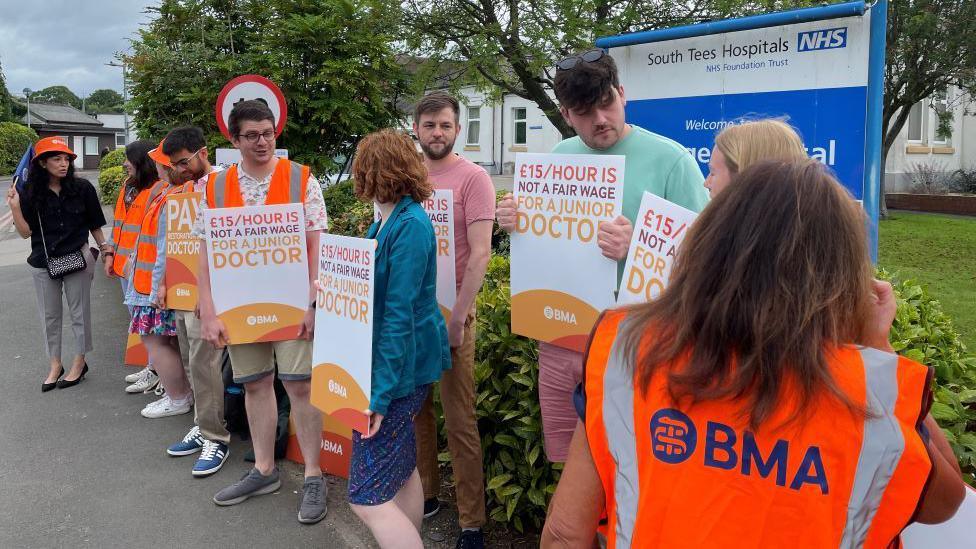
Junior doctors have been striking outside the Friarage Hospital in Northallerton
- Published
NHS leaders in Yorkshire warned of disruption as junior doctors joined a national five-day strike in their long-running dispute with the government.
Hospitals across the region said it was likely they would be significantly affected, but the priority was to keep patients safe.
Strike action by junior doctors belonging to the British Medical Association (BMA) runs from 07:00 BST on Thursday 27 June to 07:00 BST on Tuesday 2 July.
The BMA has asked for a 35% pay rise, but the government has described the claim as "unreasonable".
Routine hospital services were expected to face the most disruption because senior doctors have been drafted in to provide cover in emergency care.
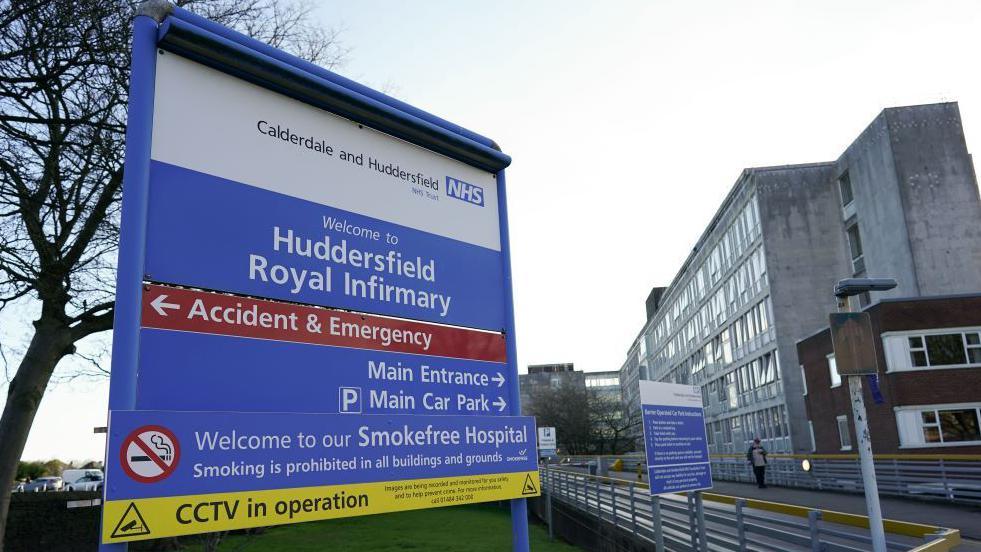
Hospitals across Yorkshire have urged patients to only attend if they need urgent medical help
Outside the Friarage Hospital in Northallerton, junior doctors said the strikes were not just about restoring pay but also ensuring patients got the care they needed.
Dr Tom Sharp, a GP trainee, said many of his doctor colleagues had moved to countries like New Zealand where he said they could “get better pay and better conditions”.
“The ultimate upshot of this is that the NHS, which is already struggling to meet demand, just cannot cope," he said.
"What that means for patients and for the public, for you and your family, is that your appointments are delayed, your operations are delayed and you don't get the care you need and that they deserve.
He said that while "a lot of our action is about pay", it was also about "improving conditions for doctors, which will direct our patient care and make our NHS better for us all".
"It’s really in the government’s power to sit round the negotiating table and it’s really in the government’s power now. Even with an election looming, Rishi Sunak could still commit to restoring our pay," he added.
Meanwhile, Sarah Peters, who described herself as an F2 doctor at the Friarage, meaning she was part way through her training, added that the strikes were “not just about pay, but also staff retention”.
“You need to retain and have staff to keep staffing safe and keep patients safe, so ultimately that’s why I’m here,” she said.
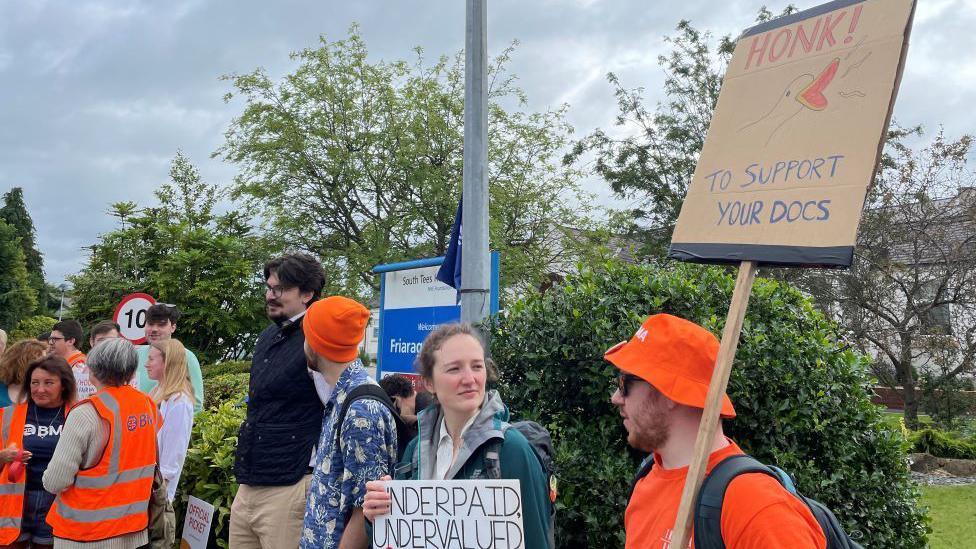
The junior doctors said they were striking for patient safety as well as for better pay
In South Yorkshire, the Minor Injuries Unit at the Royal Hallamshire Hospital in Sheffield will be closed throughout the strike period.
Sheffield Teaching Hospitals NHS Trust said: "We will be prioritising patient safety and emergency care but we are likely to have considerably fewer doctors available during this time and as a consequence waiting times will be much longer than normal for less urgent conditions or injuries."
The West Yorkshire Association of Acute Trusts (WYAAT), which is a collaboration between the six hospital trusts in West Yorkshire and Harrogate, said certain resources would be protected during the strike.
These are: emergency treatment; cancer care; critical care; maternity and neonatal care; trauma and patients who have waited the longest for elective surgery.
Dr Richard Robinson, chief medical officer at Mid Yorkshire Teaching NHS Trust, said junior doctors were a "truly valuable part of the workforce" and them striking caused "additional challenges".
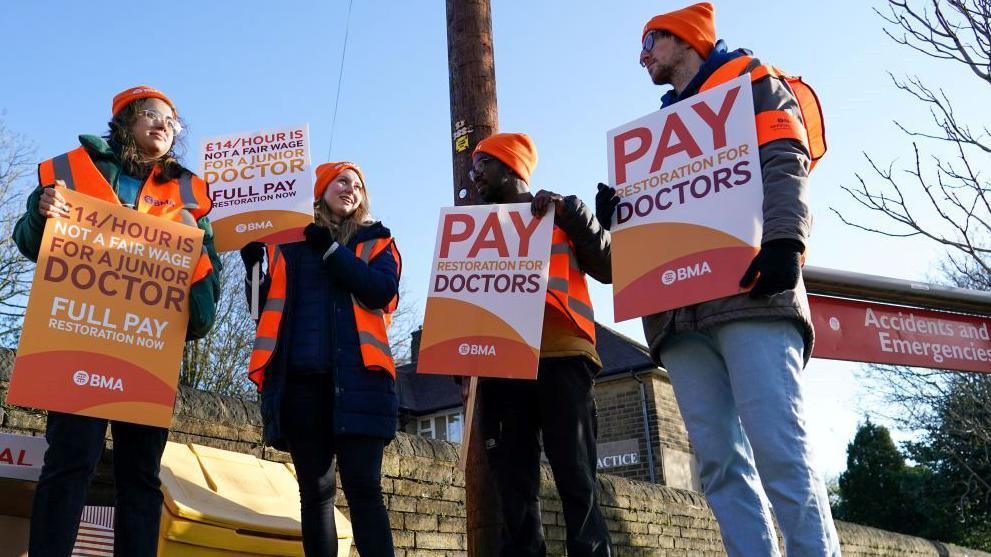
The latest action is the 11th time junior doctors have been on strike since December 2022
He said as a result there would be fewer staff available and the trust would not be "providing as much of that work as we would normally expect".
Like other hospital trusts in Yorkshire, Mr Robinson urged patients in a life-threatening emergency to call 999 as usual.
But he asked those who have a minor injury or something less serious to contact 111, the GP or their pharmacist.
Hospital trusts have also urged patients to attend planned appointments unless contacted.
However, Doncaster and Bassetlaw Hospitals NHS Trust said depending on how the week progressed, "some appointments" may be cancelled at short notice.
Industrial action by junior doctors began in December 2022, with the last strike being held in February.
The union said it was taking action as there had been no credible new offer after fresh talks started in mid-May.
'Significant pressure'
Nearly 1.5 million appointments and operations have been cancelled because of strike action in the NHS in England at an estimated cost of £3bn.
NHS England said although extensive planning and cover arrangements were in place, the strikes were expected to cause widespread disruption to routine care and difficulties with discharging patients.
Professor Sir Stephen Powis, NHS England medical director, said: “This new round of strike action will again hit the NHS very hard, with almost all routine care likely to be affected, and services put under significant pressure."
A Department of Health and Social Care spokesperson said: "Patient safety will be the priority during industrial action and the NHS has prepared for these strikes in the usual way.
"NHS England is working closely with unions to discuss any patient safety concerns and ensuring safe staffing for emergency care continues to be available."
Follow BBC Yorkshire on Facebook, external, X (formerly known as Twitter), external and Instagram, external. Send your story ideas to yorkslincs.news@bbc.co.uk, external
Related stories
- Published26 June 2024

- Published3 January 2024
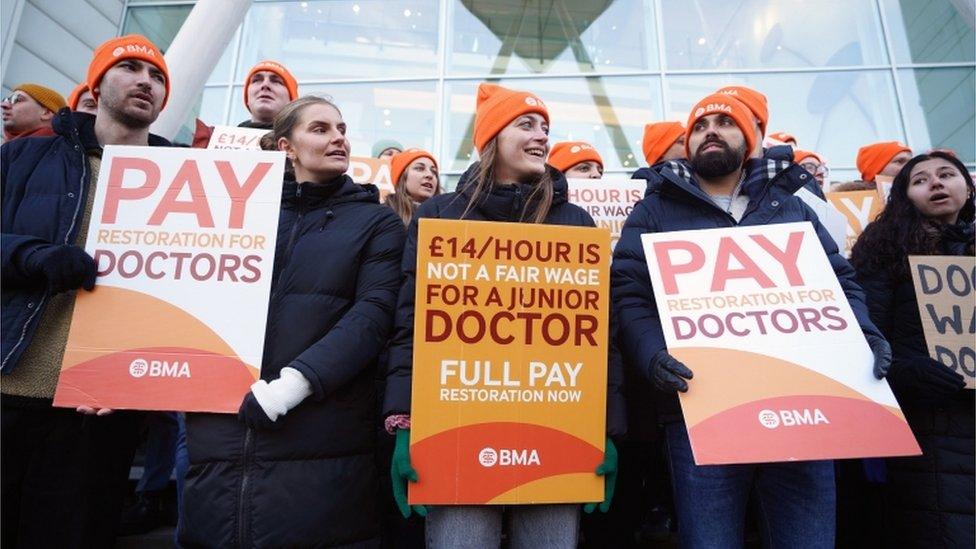
- Published11 August 2023
